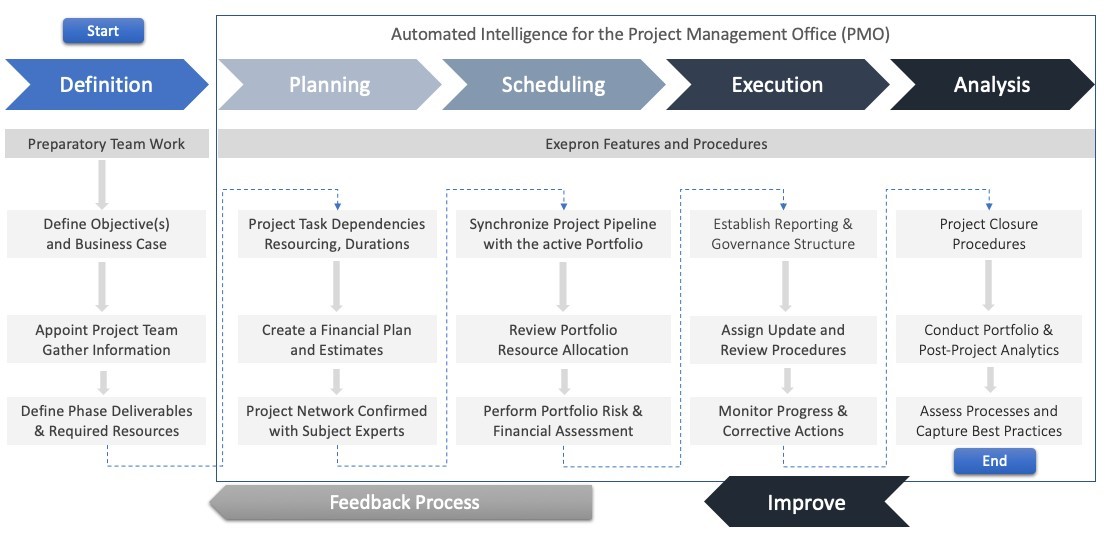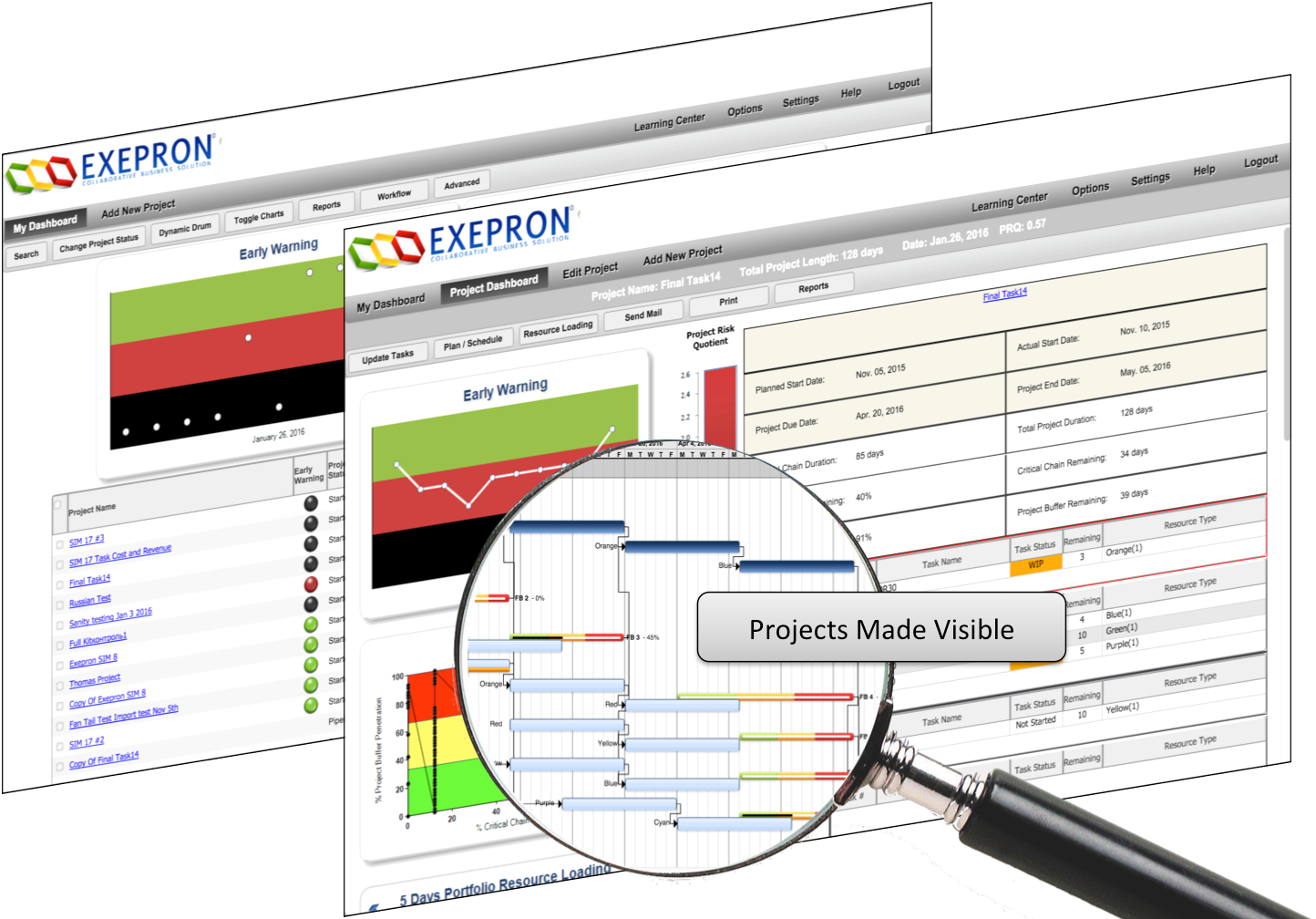The Project Management Office (PMO) remains relevant for effective project management (PM), even if you are running a Manufacturing schedule, Project Portfolio, or Agile and LEAN methodology.
PMOs should be a vital key to coordinating the required collaboration across projects large and small, single mega projects, or a portfolio of projects. The PMO continues to have broad utility, even as the PMO is becoming more decentralized and specialized.
I am text block. Click edit button to change this text. Lorem ipsum dolor sit amet, consectetur adipiscing elit. Ut elit tellus, luctus nec ullamcorper mattis, pulvinar dapibus leo.
Before setting up a PMO, we need to understand what type of PMO is required. There are generally four types of PMO.
- Portfolio Management Office: Managing a Portfolio of Projects.
- Program Management Office: Managing a Multi-Portfolio single program.
- Project Management Office: Managing a major, multi-faceted Project.
- Center of Excellence: Training, Governance, Reporting, Std. Practices.
Each PMO Type has a different focus. Regardless of the purpose they serve, all have one thing in common. They must have the backing of a senior executive to champion the set up and ongoing Value of the PMO within the organization, providing real-time intelligence to drive Business outcomes, for owners, executives, management and operators.
Plan, Schedule, Execute, Analyze, Improve

The PMO relies heavily on ensuring the stakeholders – those who will benefit from a PMO being in place, are consulted during the initial planning to ensure their objectives of a PMO are heard and established.
Common PMO Setup
The objective of the Project Management Office is to support and successful delivery projects within the organization.
The PMO is the coordinator between C-Level, Senior Managers, Managers and the Program and Project Managers (PM). PMO’s will individually support Project Managers and the Senior Management Team – report on progress, justify timely intervention and request support as required. Identify emerging Resource Limitations, blocking Items, and justifying future Resource Requirements for organizational growth.
Initially, PMO functions tend to cover the basics of project management, therefore will support in areas such as Project justification, planning, scheduling, execution, reporting, risk management, Business impacting issues and resource requirements planning.
A mature PMO, participates in recommendations for organizational strategy and growth. Providing capacity scenario testing for increased production volumes, resource requiements for new markets and new products, among others.
PMO Services should include:
- Assisting in determining Value, Risk and Strategic importance of new Projects.
- Facilitate Project Managers and PM Teams build correct Projects networks.
- Resource Management and Planning: Confirm Resource availability and suggest means to relieve portfolio resource overloading.
- Develop and propagate PM standards and decimate Best Practices.
- Ensure Daily Updating and Weekly Review meetings are practiced to ensure data, information and intelligence is current and realistic.
- Ensuring project schedules are realistic and maintained.
- Updating Project and the Portfolio risk profiles.
- Compiling Business Intelligence (BI) related to Portfolio and Project Performance.
Scheduling weekly status reports and facilitate meetings for all levels.
PMO Success
Setting up a Project Management Office for the first time means functions and services need to be defined and agreed by stakeholders.
It is not uncommon to see an efficient and valuable PMO with a few assistants. The initial service area for a Project Management Office is reporting and should be the PMOs focus when first setting up.
The real-time information flows means real-time decision to drive the PMO’s contribution and the value to the business. By adopting new Technologies PMO’s can gathering real-time information on project to best make sense of complex project data streams. The data includes resource time & costs incurred and spend forecasts; warn on emerging resource overload, manage risks and exceptions; issues resolved and intervene on outstanding issue. Project Management Office PMO can be a centralized office or work towards the healthy decentralization, developing the skill responsibility throughout the organization.
Exepron has packaged and automated the PMO Intelligence, to Plan, Schedule, Execute, Analyze and Improve a portfolio of projects.
Predicting Resource Requirements, Quoting Reliable Delivery Dates, Tracking Cost and Revenue and Reports for all levels of the organization as a package of PMO Tools.

The PMO as a Center of Excellence
As an organization increase project activity, the Center of Excellence model of PMO should also emerge. This PMO should define as creating and maintaining the standards of project management within the business. Responsible for developing project management methods, processes, tools and standards to maintain and improve on successful delivery.
Creating depth on the PM bench: the PMO as a Center of Excellence will also be responsible for improving the capability of project managers and Teams participating or staff actively manage projects. Areas of focus include defining the career path and development needs of project managers; identifying training needs and running workshops and sessions.
Advancing the PMO
The Program Management Office is concerned with interdependency management as they provide reporting across all the projects within a program and provide a consolidated view for the Program Manager. PMO’s also focus on resource management across the program, specifically allocation and forecasting. Other program specific services include benefits management, consolidated work schedules and tranche reviews.
To add to the complexity of a large program setup, each project within the program may also have a temporary Project Management Office to facilitate communication with the Program Management Office.

Portfolio Management Office supports the organization’s ability to select the right programs and projects to achieve strategic goals.
The PMO is the entity to support and link the organization’s business strategy and goals and provide means to reach those goals through programs and projects.
Portfolio Management Office provides focus on which programs and projects should be selected to achieve the strategy goals.
Functions include:
- Project justification and prioritization: ROI, CashFlows, Strategic Importance, risks.
- supporting business case development co-ordinating the project appraisals process.
- set the governance arrangements for an organization’s entire portfolio of program and project activity.
The Program and Project Management Offices on the other hand support the organization’s ability to deliver those programs and projects.
Assistance in establishing your PMO
An organization chooses how to manage and control its projects and programs; either centralized or decentralized. There is no right or wrong approach. Businesses can decide based on location, division and departmental autonomy, number of programs and projects, equipment and resource location and mobility. Every organization is unique.
Contact exepron.com for an evaluation of your unique business environment.
Successfully setting up a PMO for the first time relies heavily on two main factors. First, a clear understanding of what the PMO designed to support. Secondly, what senior management will benefit and therefore sponsor a PMO.
Exepron has vast experience in providing successful setup skills and capabilities.
Setting up a PMO, like anything, requires support and effective tools to manage a portfolio of large scale projects. PMO’s and the correct Technology should provide visibility at multiple layers of the organization – from Business Intelligence at the C-Level and appropriate information addressing the Portfolio, Program Project and Task Managers needs. Exepron’s uniques Business Intelligence Decision Support System (BIDSS) has all the tools required to support the successful PMO.



